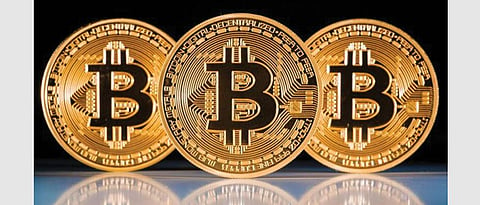

If there’s one word that has dominated most office conversations and headlines over the past few days, it is this — Bitcoin. After all, what more can one expect if the value of a currency, otherwise unheard of, rises over 1,400 per cent in one year? So let’s try and demystify this concept for our better understanding.
Bitcoin is a digital currency, also known as crypto currency, that allows you to send or receive money across the globe without involving any central bank or governmental regulation. One can also purchase goods by paying bills in Bitcoin, similar to buying goods or transferring money to friends and merchants using mobile wallets such as Paytm, Freecharge or debit/credit cards. The difference between the aforementioned transactions and Bitcoin transactions is that in the latter, money is exchanged without revealing the true identity of the buyer and seller.
How it works
Let’s consider a hypothetical case to understand how Bitcoins function. Say A wants to send Rs 10 lakh to B using Bitcoins. In this example, we will assume the value of one Bitcoin equals Rs 1 lakh; as on December 24, 2017, the value of 1 Bitcoin equalled Rs 9 lakh. Like a mobile wallet, a Bitcoin wallet, too, needs to be downloaded on the payer and payee’s mobile phone or computer.
For initiating a transaction, A needs to enter B’s address (public key), enter the number of Bitcoins to be sent, which will be 10 Bitcoins in our example, and press ‘send’ button to complete the transaction. Just like we insert a recipient’s mobile number in a mobile wallet, in this Bitcoin transaction, A will have to feed in B’s address, which looks something like this: 3MXknxVapwv6QkMoQv99MBuXZ2XpPewHn9.
B’s address consists of two important keys: A public key and a private key. A public key, is made public to the entire network for sending and receiving money whereas a private key is like a password and should not be revealed to anyone. If one forgets or loses his/her private key, then the individual stands to lose all his/her Bitcoins through hacking.
On December 20, a Bloomberg anchor, while filming a segment on Bitcoin, accidentally displayed the private key of his Bitcoin wallet on TV for 10 seconds. This was enough for a Reddit user to take his private key, hack into the anchor’s wallet and take away his Bitcoins worth USD 20. Both public and private keys are alpha numeric and long, and it is recommended to generate a new public key for every new Bitcoin transaction as a safety measure.
The entire transaction between A and B is logged digitally on computers as transaction log with details of the time of transaction, number of Bitcoins held, etc, summarising every single detail of this transaction in the log ‘blockchain’.
The entire transaction between A and B is now in public on blockchain technology and there are people constantly verifying such transactions on blockchain, ensuring all the information related to each transaction is accurate. These people are called ‘miners’ and for their service of verifying and confirming transactions, they get rewarded with new Bitcoins by the various merchants and vendors. Hence, B will receive the money only when the miner validates the transaction.
Salient features of Bitcoin transaction
Bitcoin transactions are done without involving a central bank or third party, meaning it is not regulated. The sender and receiver involved in the transaction are unknown as the money is being transferred to a public address but the sender does not know the real identity of the receiver. This is a huge disadvantage as it is speculated that Bitcoin transactions are being used to fund terrorism and drug trafficking, as well.
Bitcoin transactions are irreversible and can never be undone. The private key is non retrievable, so if you lose it, you can lose all the money in the Bitcoin wallet, as explained earlier. Bitcoin has five popular fractions: Bitcoin (1), centibitcoin (0.01 Bitcoin), milibitcoin (0.001 Bitcoin), microbitcoin (0.000001 Bitcoin) and Satoshi (0.00000001 Bitcoin).
The crypto currency is gaining popularity as many corporate giants like Microsoft, Dell, Subway, Expedia, Wordpress, etc have started accepting Bitcoins. Dubai is planning to become the world’s first blockchain-powered government and aims to get all visa applications, bill payments and licence renewals, accounting for over 100 million documents, transacted digitally on blockchain by 2020. In contrast, countries like China and India have come down hard on Bitcoins, citing its speculative nature. China has imposed a shutdown on exchanges that trade in Bitcoins and India is set to issue notices to over four lakh high networth individuals (HNIs) for suspected tax evasion in the rally that has scaled peaks of USD 20,000, from USD 1,000 in just one year.
That the Bitcoin will continue to dominate headlines and our imagination for the next few months is a given, but the pertinent question is what is the real value of the currency and whether its rally will take shape of a bubble or not.
